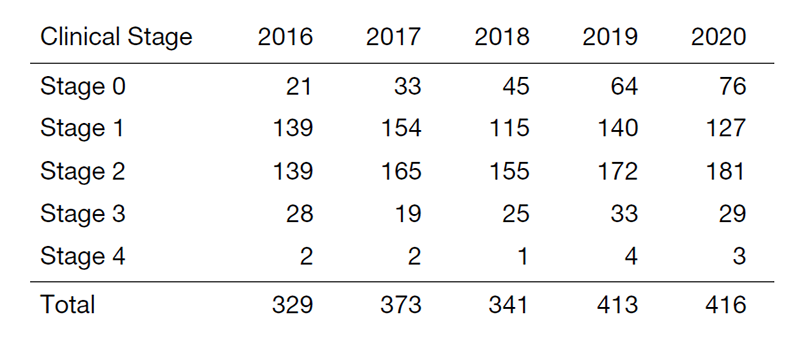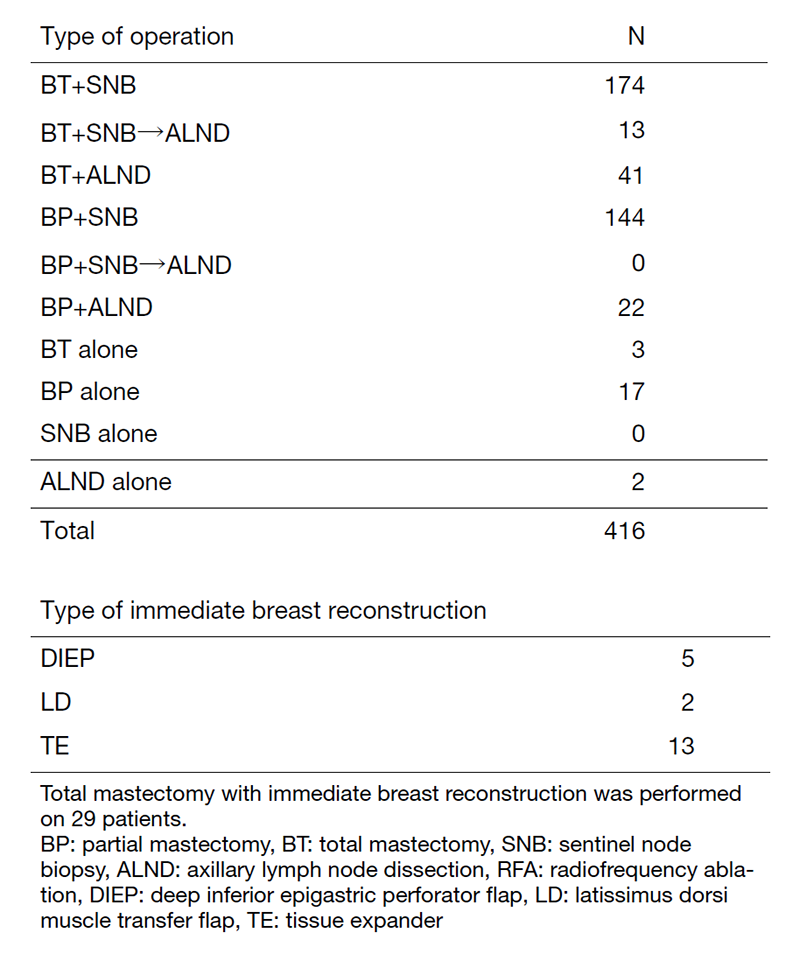Annual Report 2020
Department of Breast Surgery
Tatsuya Onishi, Chisako Yamauchi, Tsuguo Iwatani, Takamichi Yokoe, Yuki Eguchi, Yamashita Yuji, Kayono Ohnishi
Introduction
We treat patients with operable malignant mammary glands. Our main professional practices are diagnosing breast disease, providing surgical treatment and conducting follow-up for breast cancer patients. The Department of Breast Surgery is committed to providing the latest, most comprehensive breast treatments for our patients. The multidisciplinary approach to the diagnosis and treatment of cancer is performed with the cooperation of related specialists.
Our department focuses on “minimally invasive surgery” and performs thorough investigations for oncologically safe approaches, with lower morbidity and good cosmesis. For example, although sentinel lymph node (SLN) biopsy has been established as the standard care for clinical node negative patients, omitting axillary lymph node dissection (ALND) for positive SLNs has been included in clinical practice as an expanded indication. Preoperative systemic therapy provides the opportunity for a curative operation or breast-conserving surgery to avoid mastectomy. Moreover, we can provide breast reconstructive surgery in collaboration with the Department of Plastic and Reconstructive Surgery. These procedures will contribute to a better quality of life for patients with breast cancer.
The Team and What We Do
For the regular activities of our department, a daily morning round is scheduled for inpatients by all staff. Moreover, our weekly preoperative diagnostic imaging conference is conducted to discuss each patient's surgical treatment planning. A clinical conference to decide on the treatment courses by multidisciplinary breast care team members is held twice a month. A monthly pathological conference on breast cancer is also conducted. At these conferences, individual cases are presented to a team of highly trained cancer specialists, including radiologists, breast surgeons, pathologists, radiation oncologists, and medical oncologists. Our multidisciplinary team approach to breast cancer treatment provides superior-quality care to patients.
Changes in the annual number of patients with breast cancer who underwent surgery are shown in Table 1. Surgeries were performed on 416 patients with primary breast cancer and 57 patients with recurrent or iatrogenic breast cancer.
Table 1. Number of primary breast cancer patients who underwent surgery during 2016-2020

Thirteen immediate breast reconstruction surgeries were included. Of the patients with primary breast cancer, 58 (14%) underwent primary systemic therapy. The types and number of operative procedures performed in 2020 are shown in Table 2. The rate of breast-conserving surgery was 44% (183/416). Sentinel node biopsy was performed on 351 patients, and 318 patients were spared from ALND. The number of immediate breast reconstruction surgeries using tissue expanders decreased in 2019 because the tissue expanders were recalled due to breast implant-associated anaplastic large cell lymphoma; however, there was a recovery the number of surgeries in 2020 (2018, 18 cases; 2019, 5 cases).
Table 2. Types and number of procedures performed in 2020 for primary breast cancer

Research activities
We contribute to establishing new standard treatments for breast cancer patients by actively enrolling participants in clinical trials. The clinical trials we are currently conducting are as follows.
Clinical trials
1) Single-arm confirmatory trial of endocrine therapy alone for estrogen receptor-positive, low-risk ductal carcinoma of the breast in situ (JCO1505, LORETTA Trial): This is a single-arm interventional study to confirm whether endocrine therapy alone for ER-positive low-risk DCIS is safe and effective compared with the current standard treatment.
2) Study for avoiding mastectomy using trastuzumab, pertuzumab and radiation for breast cancer (JCOG1806, AMATERAS-BC): This is single-arm study to confirm the efficacy of avoiding surgical treatment for HER2-positive breast cancer patients who received neoadjuvant chemotherapy and achieved complete response.
3) Estimation of willingness to pay for breast cancer treatments through contingent valuation method in Japanese breast cancer patients (JCOG1709A): This is a prospective observational study to elucidate how Japanese breast cancer patients consider the financial value of their life and health by using the contingent valuation method, prospectively.
4) Radiofrequency ablation (RFA) using a Cool-tip electrode system: A phase II study of RFA without resection was performed for T=<1.5 cm, N0 breast cancer patients using a Cool-tip electrode system (RAFAELO study); patients were offered RFA therapy for early breast cancer (PO-RAFAELO study).
5) Effectiveness of primary tumor resection for metastatic breast cancer (JCOG 1017): In this clinical trial, the primary tumor resection plus systemic therapy arm is compared with the systemic therapy alone arm in metastatic breast cancer.
6) Intensive vs. standard post-operative surveillance in high-risk breast cancer patients (JCOG1204, INSPIRE Trial): This is a randomized phase III trial to confirm the superiority of intensive follow-up to standard follow-up in terms of overall survival in high-risk breast cancer patients.
7) The Real-World Data of Treatment with Abemaciclib for HR-positive HER2-negative Metastatic Breast Cancer: A Multicentral Cohort Study: The aim of this study is to evaluate the clinical characteristics and efficacy of abemaciclib in patients with hormone receptor positive, HER2 negative, metastatic recurrent breast cancer.
Education
Our goal is to train residents to become leaders in breast cancer treatment from clinical and research perspectives. On the clinical side, we improve the understanding of breast diseases through various conferences and provide surgical guidance. We also provide guidance for conference presentations and writing papers, along with support for obtaining medical specialties and degrees.
Future Prospects
We will deliver appropriate postoperative follow-up care, which has been a long-time concern in breast cancer medical care. We also aim to further develop surgical approaches with minimally invasive and cosmetic surgery. Moreover, we will construct an evaluation axis from the patients' viewpoint for the cost effectiveness of clinical trials to establish standard treatments for breast cancer.
List of papers published in 2020
Journal
1. Iwatani T, Hara F, Shien T, Sasaki K, Katayama H, Fukuda H, Shiroiwa T, Iwata H. Prospective observational study estimating willingness-to-pay for breast cancer treatments through contingent valuation method in Japanese breast cancer patients (JCOG1709A). Jpn J Clin Oncol, 51:498-503, 2021
2. Yokoe T, Kurozumi S, Nozawa K, Ozaki Y, Maeda T, Yazaki S, Onishi M, Fujimoto A, Nakayama S, Tsuboguchi Y, Iwasa T, Sakai H, Ogata M, Terada M, Nishimura M, Onoe T, Masuda J, Kurikawa M, Isaka H, Hagio K, Shimomura A, Okumura Y, Futamura M, Shimokawa M, Takano T. Clinical benefit of treatment after trastuzumab emtansine for HER2-positive metastatic breast cancer: a real-world multi-centre cohort study in Japan (WJOG12519B). Breast Cancer, 28:581-591, 2021
3. Maeda H, Hayashida T, Watanuki R, Kikuchi M, Nakashoji A, Yokoe T, Seki T, Takahashi M, Kitagawa Y. Predictors of invasive disease in patients preoperatively diagnosed with ductal carcinoma without stromal invasion, with breast magnetic resonance imaging (MRI) and ultrasound (US). Breast Cancer, 28:398-404, 2021
4. Hasegawa Y, Matsubara N, Kogawa T, Naito Y, Harano K, Hosono A, Onishi T, Hojo T, Shimokawa M, Mukohara T. Neo-Bioscore in Guiding Post-surgical Therapy in Patients With Triple-negative Breast Cancer Who Received Neoadjuvant Chemotherapy. In Vivo, 35:1041-1049, 2021
5. Nakashoji A, Hayashida T, Yamaguchi S, Kawai Y, Kikuchi M, Yokoe T, Nagayama A, Seki T, Takahashi M, Kitagawa Y. Comprehensive analysis of the homeobox family genes in breast cancer demonstrates their similar roles in cancer and development. Breast Cancer Res Treat, 186:353-361, 2021
6. Takeshima K, Hayashida T, Maeda H, Nakashoji A, Yokoe T, Seki T, Takahashi M, Kitagawa Y. Increased frequency of ESR1 mutation in metastatic breast cancer by dosing selective estrogen receptor modulator followed by aromatase inhibitor. Oncol Lett, 20:1231-1238, 2020
7. Kubouchi K, Shimada K, Yokoe T, Tsutsumi Y. Avoidance and Period-Shortening of Neoadjuvant Chemotherapy Against Triple-Negative Breast Cancer in Stages I and II: Importance of Ki-67 Labeling Index and the Recognition of Apocrine-Type Lesions. Technol Cancer Res Treat, 19:1533033820943246, 2020
8. Watanuki R, Hayashida T, Yokoe T, Kawai Y, Kikuchi M, Nakashoji A, Nagayama A, Seki T, Takahashi M, Kitagawa Y. Impact of neoadjuvant and adjuvant chemotherapy on invasive lobular carcinoma: A propensity score-matched analysis of SEER data. Breast J, 26:1765-1770, 2020
9. Yamashita T, Masuda N, Saji S, Araki K, Ito Y, Takano T, Takahashi M, Tsurutani J, Koizumi K, Kitada M, Kojima Y, Sagara Y, Tada H, Iwasa T, Kadoya T, Iwatani T, Hasegawa H, Morita S, Ohno S. Trastuzumab, pertuzumab, and eribulin mesylate versus trastuzumab, pertuzumab, and a taxane as a first-line or second-line treatment for HER2-positive, locally advanced or metastatic breast cancer: study protocol for a randomized controlled, non-inferiority, phase III trial in Japan (JBCRG-M06/EMERALD). Trials, 21:391, 2020
10. Shingaki S, Kogawa T, Shimokawa M, Harano K, Naito Y, Kusuhara S, Fujimoto Y, Matsubara N, Hosono A, Mukai H, Onishi T, Hojo T, Mukohara T. Use of eribulin as an earlier-line chemotherapy for patients with HER2-negative metastatic breast cancer. J Cancer, 11:4099-4105, 2020
